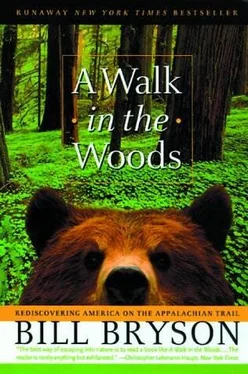Bill Bryson - A Walk In The Woods
Здесь есть возможность читать онлайн «Bill Bryson - A Walk In The Woods» весь текст электронной книги совершенно бесплатно (целиком полную версию без сокращений). В некоторых случаях можно слушать аудио, скачать через торрент в формате fb2 и присутствует краткое содержание. Жанр: Современная проза, на английском языке. Описание произведения, (предисловие) а так же отзывы посетителей доступны на портале библиотеки ЛибКат.
- Название:A Walk In The Woods
- Автор:
- Жанр:
- Год:неизвестен
- ISBN:нет данных
- Рейтинг книги:4 / 5. Голосов: 1
-
Избранное:Добавить в избранное
- Отзывы:
-
Ваша оценка:
- 80
- 1
- 2
- 3
- 4
- 5
A Walk In The Woods: краткое содержание, описание и аннотация
Предлагаем к чтению аннотацию, описание, краткое содержание или предисловие (зависит от того, что написал сам автор книги «A Walk In The Woods»). Если вы не нашли необходимую информацию о книге — напишите в комментариях, мы постараемся отыскать её.
A Walk In The Woods — читать онлайн бесплатно полную книгу (весь текст) целиком
Ниже представлен текст книги, разбитый по страницам. Система сохранения места последней прочитанной страницы, позволяет с удобством читать онлайн бесплатно книгу «A Walk In The Woods», без необходимости каждый раз заново искать на чём Вы остановились. Поставьте закладку, и сможете в любой момент перейти на страницу, на которой закончили чтение.
Интервал:
Закладка:
“How do you feel?” he said.
I flexed my legs experimentally. “Not too bad, actually.”
“Me either.”
He poured water into the filter cone. “I’m going to be good today,” he promised.
“Good.” I watched over his shoulder. “Is there a reason,” I asked, “why you are filtering the coffee with toilet paper?”
“I, oh…I threw out the filter papers.”
I gave a sound that wasn’t quite a laugh. “They couldn’t have weighed two ounces.”
“I know, but they were great for throwing. Fluttered all over.” He dribbled on more water. “The toilet paper seems to be working OK, though.”
We watched it drip through and were strangely proud. Our first refreshment in the wilderness. He handed me a cup of coffee. It was swimming in grounds and little flecks of pink tissue, but it was piping hot, which was the main thing.
He gave me an apologetic look. “I threw out the brown sugar too, so there won’t be any sugar for the oatmeal.”
Ah. “Actually, there won’t be any oatmeal for the oatmeal. I left it in New Hampshire.”
He looked at me. “Really?” then added, as if for the record: “I love oatmeal.”
“What about some of that cheese?”
He shook his head. “Flung.”
“Peanuts?”
“Flung.”
“Spam?”
“Really flung.”
This was beginning to sound a trifle grave. “What about the baloney?”
“Oh, I ate that at Amicalola,” he said, as if it had been weeks ago, then added in a tone of sudden magnanimous concession, “Hey, I’m happy with a cup of coffee and a couple of Little Debbies.”
I gave a small grimace. “I left the Little Debbies, too.”
His face expanded. “You left the Little Debbies?”
I nodded apologetically.
“All of them?”
I nodded.
He breathed out hard. This really was grave-a serious challenge, apart from anything else, to his promised equanimity. We decided we had better take inventory. We cleared a space on a groundsheet and pooled our commissary. It was startlingly austere-some dried noodles, one bag of rice, raisins, coffee, salt, a good supply of candy bars, and toilet paper. That was about it.
We breakfasted on a Snickers bar and coffee, packed up our camp, hoisted our packs with a sideways stagger, and set off once again.
“I can’t believe you left the Little Debbies,” Katz said, and immediately began to fall behind.
Chapter 4
Woods are not like other spaces. To begin with, they are cubic. Their trees surround you, loom over you, press in from all sides. Woods choke off views and leave you muddled and without bearings. They make you feel small and confused and vulnerable, like a small child lost in a crowd of strange legs. Stand in a desert or prairie and you know you are in a big space. Stand in a woods and you only sense it. They are a vast, featureless nowhere. And they are alive.
So woods are spooky. Quite apart from the thought that they may harbor wild beasts and armed, genetically challenged fellows named Zeke and Festus, there is something innately sinister about them, some ineffable thing that makes you sense an atmosphere of pregnant doom with every step and leaves you profoundly aware that you are out of your element and ought to keep your ears pricked. Though you tell yourself it’s preposterous, you can’t quite shake the feeling that you are being watched. You order yourself to be serene (it’s just a woods for goodness sake), but really you are jumpier than Don Knotts with pistol drawn. Every sudden noise-the crack of a falling limb, the crash of a bolting deer-makes you spin in alarm and stifle a plea for mercy. Whatever mechanism within you is responsible for adrenaline, it has never been so sleek and polished, so keenly poised to pump out a warming squirt of adrenal fluid. Even asleep, you are a coiled spring.
The American woods have been unnerving people for 300 years. The inestimably priggish and tiresome Henry David Thoreau thought nature was splendid, splendid indeed, so long as he could stroll to town for cakes and barley wine, but when he experienced real wilderness, on a visit to Katahdin in 1846, he was unnerved to the core. This wasn’t the tame world of overgrown orchards and sun-dappled paths that passed for wilderness in suburban Concord, Massachusetts, but a forbidding, oppressive, primeval country that was “grim and wild…savage and dreary,” fit only for “men nearer of kin to the rocks and wild animals than we.” The experience left him, in the words of one biographer, “near hysterical.”
But even men far tougher and more attuned to the wilderness than Thoreau were sobered by its strange and palpable menace. Daniel Boone, who not only wrestled bears but tried to date their sisters, described corners of the southern Appalachians as “so wild and horrid that it is impossible to behold them without terror.” When Daniel Boone is uneasy, you know it’s time to watch your step.
When the first Europeans arrived in the New World, there were perhaps 950 million acres of woodland in what would become the lower forty-eight states. The chattahoochee Forest, through which Katz and I now trudged, was part of an immense, unbroken canopy stretching from southern Alabama to Canada and beyond, and from the shores of the Atlantic to the distant grasslands of the Missouri River.
Most of that forest is now gone, but what survives is more impressive than you might expect. The chattahoochee is part of four million acres-6,000 square miles-of federally owned forest stretching up to the Great Smoky Mountains and beyond and spreading sideways across four states. On a map of the United States it is an incidental smudge of green, but on foot the scale of it is colossal. It would be four days before Katz and I crossed a public highway, eight days till we came to a town.
And so we walked. We walked up mountains and through high, forgotten hollows, along lonesome ridges with long views of more ridges, over grassy balds and down rocky, twisting, jarring descents, and through mile after endless mile of dark, deep, silent woods, on a wandering trail eighteen inches wide and marked with rectangular white blazes (two inches wide, six long) slapped at intervals on the grey-barked trees. Walking is what we did.
Compared with most other places in the developed world, America is still to a remarkable extent a land of forests. One-third of the landscape of the lower forty-eight states is covered in trees-728 million acres in all. Maine alone has 10 million uninhabited acres. That’s 15,600 square miles, an area considerably bigger than Belgium, without a single permanent resident. Altogether, just 2 percent of the United States is classified as built up.
About 240 million acres of America’s forests are owned by the government. The bulk of this-191 million acres, spread over 155 parcels of land-is held by the U.S. Forest Service under the designations of National Forests, National Grasslands, and National Recreation Areas. All this sounds soothingly untrampled and ecological, but in fact a great deal of Forest Service land is designated “multiple-use,” which is generously interpreted to allow any number of boisterous activities-mining, oil, and gas extraction; ski resorts (137 of them); condominium developments; snowmobiling; off-road vehicle scrambling; and lots and lots and lots of logging-that seem curiously incompatible with woodland serenity.
The Forest Service is truly an extraordinary institution. A lot of people, seeing that word forest in the title, assume it has something to do with looking after trees. In fact, no-though that was the original plan. It was conceived a century ago as a kind of woodland bank, a permanent repository of American timber, when people grew alarmed at the rate at which American forests were falling. Its mandate was to manage and protect these resources for the nation. These were not intended to be parks. Private companies would be granted leases to extract minerals and harvest timber, but they would be required to do so in a restrained, intelligent, sustainable way.
Читать дальшеИнтервал:
Закладка:
Похожие книги на «A Walk In The Woods»
Представляем Вашему вниманию похожие книги на «A Walk In The Woods» списком для выбора. Мы отобрали схожую по названию и смыслу литературу в надежде предоставить читателям больше вариантов отыскать новые, интересные, ещё непрочитанные произведения.
Обсуждение, отзывы о книге «A Walk In The Woods» и просто собственные мнения читателей. Оставьте ваши комментарии, напишите, что Вы думаете о произведении, его смысле или главных героях. Укажите что конкретно понравилось, а что нет, и почему Вы так считаете.












